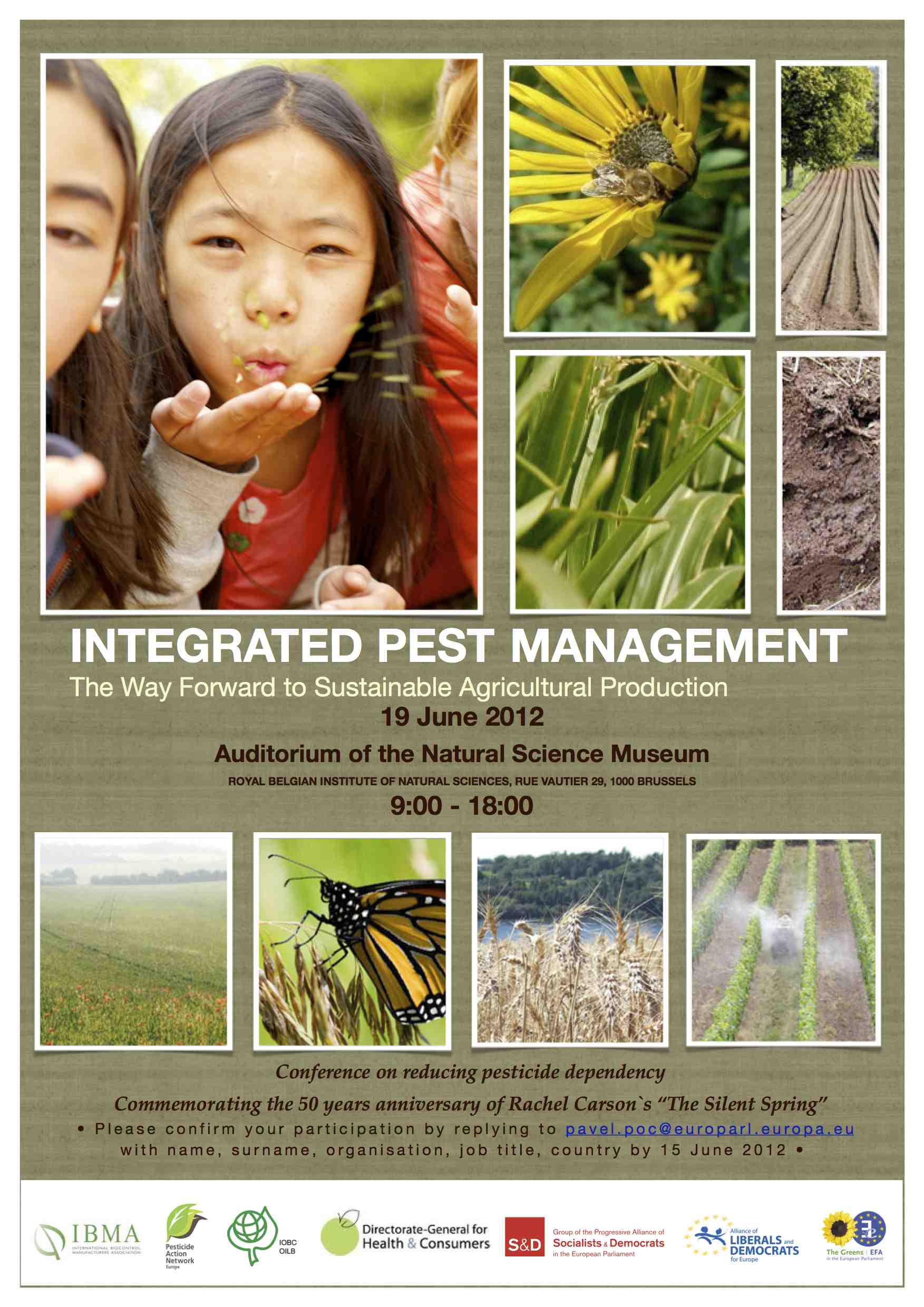Programme
9.00 IPM and its role in sustainable production - chaired by Karel Bolckmans
-
Welcome by Pavel Poc, MEP
-
Why this conference by Owen Jones, president of IBMA
-
Ladislav Miko, Deputy Director-General in the European Commission, DG SANCO "The EU strategy for sustainable plant protection"
-
Vesna Valant, Member of the cabinet of Commissioner Potočnik, "IPM an essential tool to ensure the needed resource efficiency"
-
Eva Reinhard, Deputy Director of the Swiss Federal Office of Agriculture, "The Swiss agricultural policy – how a policy assists the sustainable use of pesticides"
10.20-10.50 Break
10.50 The state of the environment in a resource-constrained world - chaired by Andrea Zanoni, Member of the European Parliament
-
David Pimentel, Professor of Entomology and Ecology, College of Agriculture and Life Sciences, Cornell University, "50 years after the Silent Spring: successes and future challenges"
-
Pavel Poc, Member of the European Parliament, "Behavioural effects of pesticides on bees – non-toxic, still lethal"
-
Questions & Answers
11.55 The need for a paradigm change in European agriculture – what is not IPM Chaired by Michael Hamell, head of unit, DG ENVI European Commission
-
Dan Jørgensen, Member of European Parliament, vice president of the ENVI committee, "the need for a paradigm change in the Common Agricultural Policy"
-
Erik Mathijs, professor at the University of Leuven, "Sustainable food consumption and production in a resource-constrained world, 3rd SCAR foresight exercise"
-
David Baldock, Institute for European Environmental Policy, "The potential of the Common Agricultural to incentivise reductions in agrochemical dependency"
-
Questions & Answers
13.10 Lunch – IBMA exhibition with examples of sector-specific IPMs, opening by Michele Rivasi, Member of the European Parliament
14.40 Examples of IPM – advantages of IPM - chaired by Michael Flüh, head of unit, DG SANCO European Commission
-
Frank Wijnands, Wageningen UR and IP Commission of IOBC "Different strategies to implement IPM in practice: about incentives and impact"
-
Chris Serra, LIVE wine cooperative, Oregon, United States (LIVE is one of IOBC endorsed organisations), "Improving sustainability: partnerships and certification, experiences"
-
Bertrand Omon, Chambre d’agriculture Eure, France, "When a group of farmers engage seriously in reducing pesticide dependency – it can be done"
15.40-16.10 Break
16.10 IPM the key for the European innovative partnership in agriculture - chaired by Frank Wijnards: Wageningen University and research centre
-
Alina Stefania Ujupan, member of the cabinet of Commissioner Cioloș, "Incentives and innovation at the heart of Commission policy to foster the use of sustainable practices in EU agriculture and the food chain"
-
Franz Bigler, Agroscope and President of IOBC, "Pesticide reduction – what are the alternatives?" – an overview
-
Karel Bolckmans, IBMA, "Future promising technologies that require further research – why IPM is smart, sustainable and inclusive growth"
17.10-17.30 Conclusion by Francois Veillerette, president of PAN Europe
Who are we:
IOBC/WPRS is an International Organisation of progressive European researchers and other knowledgeable people investigating the use of sustainable, environmentally safe, economically feasible socially acceptable control methods of pests and diseases of agricultural crops. Therefore IOBC/WPRS encourages collaboration in the development and promotion of Biological and Integrated Pest Management. IOBC/WPRS fosters research and practical application, training and information exchange, especially of all methods including biological control within an integrated pest management context. IOBC/WPRS produces guidelines for integrated production of agricultural crops, collaborates with different stakeholders to develop sustainable agricultural production systems and standardises methods of testing effects of pesticides on beneficial species with the aim to foster biodiversity and ecological services as a natural resource.
IBMA is the association of biocontrol industries producing solutions: microorganisms, macroorganisms, semiochemicals and natural products for plant protection. Based on long years of intensive research and development, the "Biocontrol industry" is now growing fast and can offer safe and cost-effective solutions to the entire food chain. IBMA was created in 1995 to represent the views of the developing biological control manufacturers, which are mainly SME’s with limited resources, research organisations, extension services, consultants, distributors, contributing to the development of biocontrol and participating in IBMA activities.
PAN Europe is an NGO working to minimise negative effects and replace the use of hazardous chemicals with ecologically sound alternatives. Our network brings together public health, environmental organisations and women's groups from across 19 European countries. We work to eliminate dependency on chemical pesticides and to support safe sustainable pest control methods.
